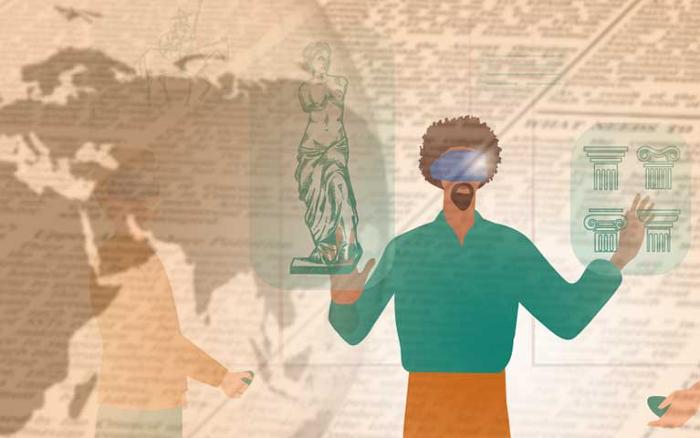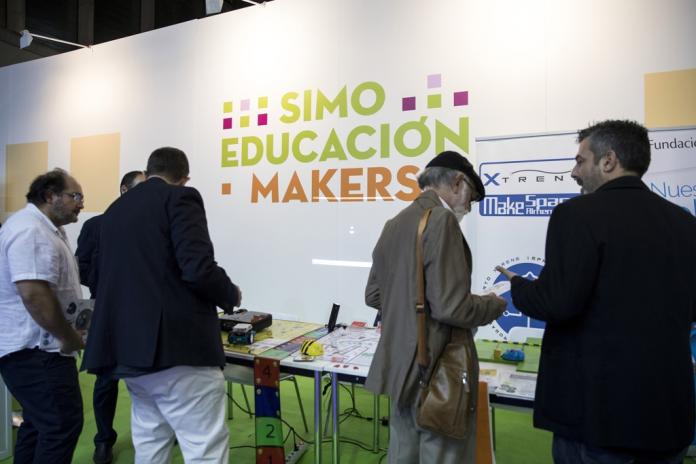

Knowledge through practise at SIMO EDUCATION MAKERS


An area with practical demonstrations where teachers and students from several centres will show, live, the ‘maker’ projects that they produced and where technology has played an important part
Organised by IFEMA, the Fair will be held from the 13 to the 15 November in Hall 14.1 of the Feria de Madrid.
The ‘maker’ activities for the classroom will again be highlighted at the next edition of SIMO EDUCATION, the Learning Technology Exhibition organised by IFEMA from the 13 to 15 November at Feria de Madrid. The SIMO EDUCATION MAKERS is the area where teachers and students from various educational centres will show, live, the ‘maker’ projects that they have developed with robots, and robotics kits and packs, electronics, 3D printers, etc. The aim is to provide teachers with a platform where they can show, in a practical manner, the possibilities provided by these activities applicable to any subject and education level and where technology plays an essential role.
Within this context, the three SEK centres in Madrid –SEK Ciudalcampo, SEK Santa Isabel and SEK El Castillo- will participate all three days, showing various examples of what they are doing in their school's makers areas. The first workshop, organised by Mercedes Redondo, director of the Maker area of the Colegio Internacional SEK Ciudalcampo, will focus on STEAM FOR GOOD; #PlaceBasedEducation and #VirtualReality: combining relations, and SEK Fab Lab, a look at the application of STEAM skills in all educational levels. The SEK Santa Isabel and SEK El Castillo programs will offer workshops on 3D design, robotics and programming with Scratch, Arduino, and others.
The session prepared by Ultra-Lab on Creative electronics for children, from Pre-school to Secondary, will be held on the first day of the fair, Tuesday the 13, in the morning. It will propose experimenting with tools such as Cubetto, Chubitronics stickers, conductive ink and Bare Conductive Touch boards, in order to spontaneously acquire technological skills (electricity and electronics), where the true value resides in the project that the student has designed.
The IES Vegas Bajas Montijo school, participating in the program of presentations on Wednesday the 14 November in the afternoon, will focus on Introduction to Robotics in a workshop where robots will be built with Arduino and there will be an introduction to ROS (Robot Operating System) at school level.
Also on Wednesday, in the afternoon, the Unidad María de Maeztu DTIC of the Universidad Pompeu Fabra of Barcelona will show its strategy to fight against gender stereotypes in ICT, with its project Wisibilízalas, where girls and boys work in the classroom on profiles of feminine ICT engineers. The purpose is to fight against stereotypes and biases (whether conscious or unconscious) while promoting a creative attitude in students within contexts of open knowledge such as Wikipedia.
Two projects will be presented on Thursday the 15 in the morning, one by Science World, which will invite students to practise with ScienceWorld in a Box, the new STEM kits for schools, containing all of the elements for activities (reagents, PPEs, instructions…) and one by the School Miguel de Cervantes of Leganés, called MENTORS #cervanbot#: learning while sharing: ApS, with students of 5th year of primary, from the centre that participated in the technorobotics conference Cervanbot, using robots and kits such as MRT Sensing; Goma Brain and mBot.
On Thursday afternoon the Spanish-British School of Tenerife will offer the activity Manufacturing scientific games, with Secondary and Higher-secondary students explaining how they made a series of games based on chemistry and biology content. The Nelson centre will also show its project “Solidarity Arcade” in a workshop where the teachers and students that built it will provide details on how they made an arcade game using discarded materials. The project was developed in collaboration with the Spanish Centre for Solidarity, Misspink.es: one of them will build the wooden cabinet and the other will make the vinyl designs that will decorate the machines.
Within Vocational Training, the VT CENTRE JOSÉ RAMÓN OTERO is organising three workshops with its students, on Thursday the 15 in the morning.
The first one will show the assembly of an Integrated Circuit for a Hydraulic Plant made with household materials, that shows the various parts of a hydraulic plant.
The second workshop, Vehicle structure, deformation and formation of the body, will analyse the types of deformations undergone by vehicles and the forces that intervene, as well as proposals for their repair. Students will work with a model of a vehicle repair bench and a car structure made of metal rods, where deformations are caused simulating a collision.
The third workshop, LED screen with Bluetooth, will show how we can control text appearing on an LED screen, through our mobile phone with Bluetooth, communicating between the screen and the phone with a circuit comprised of an Arduino for data input and output.



